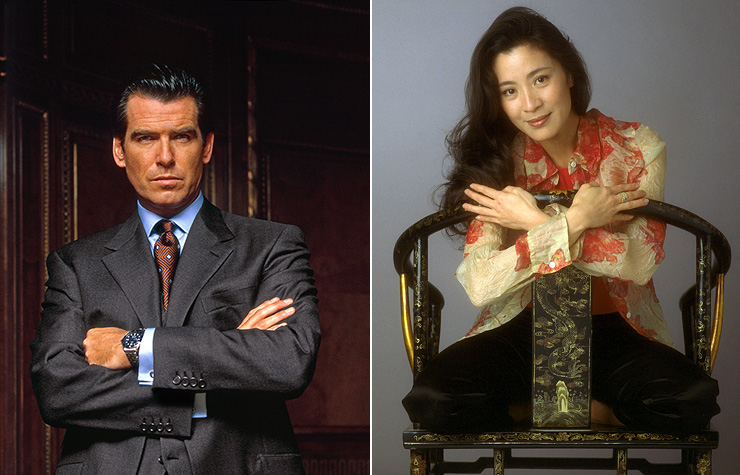 |
|
At the end of July,
Pierce Brosnan and Michelle Yeoh moved to the ‘007 Stage’ at Pinewood
Studios, which was being used for the first time in the series since
The Living Daylights, a decade earlier. The underwater unit captured
the scenes for the film’s climax on board Carver’s stealth vessel. The
final shooting script for Tomorrow Never Dies was dated August 18,
1997 and credited to Bruce Feirstein, based on screenplays and revisions by
David Campbell Wilson, Nicolas Meyer, and Daniel Petrie Jr. The final
script had some 127 added scenes included, and 149 deleted from the first
draft, with very little of the original script remaining. Principal
photography ended on September 5th, leaving just three months of
post-production before the film was due in cinemas. The job of crafting
the footage from five different units into a coherent story fell to
Dominique Fortin [the series’ first female editor since Thelma Connell,
who was ultimately replaced on You Only Live Twice (1967)] and
Michel Arcand, with Director and ex-editor Roger Spottiswoode overseeing
the process with the two Canadian-born editors. |
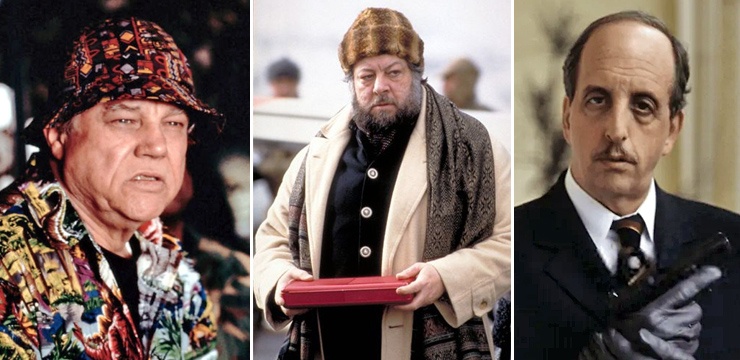 |
|
ABOVE: AN ECLECTIC
CAST (left) Reprising his role as CIA liaison Jack
Wade, American actor Joe Don Baker makes his third and final
appearance in the James Bond series in Tomorrow Never Dies.
(centre) American stage magician, actor and writer Ricky Jay
(1926-2018) played cyber-terrorist and arms dealer Henry Gupta.
(right) American actor Vincent Schiavelli (1948-2005) played the German
professional assassin Dr. Kaufman. |
|
|
|
Long-time James Bond
composer John Barry (1933-2011) [pictured below left] had been in discussions with the producers
to return to the series after a ten-year gap. Ultimately, Barry could not
agree terms. However, he recommended composer David Arnold after meeting him and hearing
some of the tracks for his upcoming album of James Bond covers Shaken
And
Stirred: The DAVID ARNOLD James Bond Project (1997). |
 |
|
David Arnold recorded his score for Tomorrow Never Dies over six months,
beginning on May 31, 1997 - and also collaborated with Alex Gifford of
Propellerheads for the track ‘Back Seat Driver’, which accompanied the
frenetic car chase in the Hamburg car park. Arnold and Gifford had also
recorded a new version of John Barry’s ‘On Her Majesty’s Secret Service’,
which was one of the highlights of the Shaken And Stirred album. The
track, which also appears on the Propellerheads 1998 album
Decksandrumsandrockandroll, was released as a single [pictured
above right] in the UK, and peaked appropriately at number (00)7 in the
chart on October 18, 1997. |
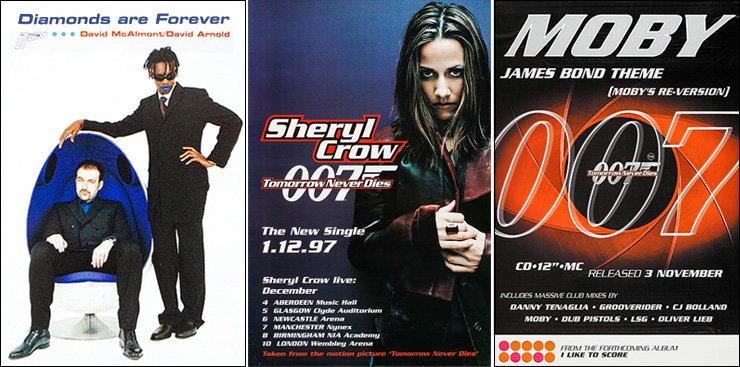 |
|
David Arnold had written a proposed title song for Tomorrow Never Dies
called ‘Surrender’ with lyricist
Don Black and singer-songwriter David McAlmont [pictured above with Arnold], who recorded the demo (the pair had previously collaborated on
Shaken And Stirred album with McAlmont performing the
Shirley Bassey
classic ‘Diamonds Are Forever’). The theme was also interpolated into
Arnold’s score for Tomorrow Never Dies, with the song ultimately
recorded by popular Canadian singer
k.d. lang. However, there were many
other submissions for a title song from other artistes including Pulp,
Saint Etienne, Marc Almond, and
Sheryl Crow. The producers chose Sheryl
Crow's song for the main titles, and Arnold's composition was used over
the end titles. As had been the case with John Barry’s score for
Thunderball in 1965, David Arnold was still composing and recording
music for Tomorrow Never Dies when it came time to assemble the
soundtrack album in readiness for its November 25th release date.
Consequently, the original 1997 A&M album only reflected two-thirds
of the finished score. Just over two years later a second soundtrack album
was released by Chapter III Records and included seven more tracks
from the rest of the film. The 2000 album dropped Sheryl Crow’s title song
and ‘James Bond Theme (Moby’s Re-version)’, which had been recorded by the
popular American musician, songwriter, singer and producer Richard
Melville Hall - known professionally as Moby. The techno remix of
Monty
Norman’s ‘James Bond Theme’ featured dialogue samples of Pierce Brosnan
from GoldenEye (1995) and Sean Connery and Gert Frobe from
Goldfinger (1964) and was a big international hit reaching #1 in
Iceland! (and also the top spot in the UK Independent Chart). The track
was used during the promotion of Tomorrow Never Dies, but not heard
in the film. |
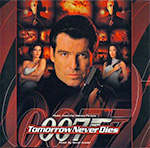 |
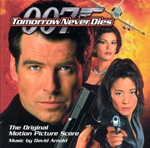 |
The score for
Tomorrow Never Dies (1997) has been released three times on
CD. The original 1997 A&M album (far left) only featured
tracks from the first two-thirds of the film. A 2000 release from
Chapter III Records (left) expanded the track selection to
include music from the entire film, but dropped the vocal
performances of Sheryl Crow and k.d. lang. A 2022 25th anniversary
double-CD release from
La-la Land Records (right)
presented an expanded and remastered version of the complete
score. |
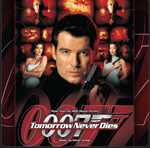 |
|
|
|
In recognition of Albert
R. Broccoli's insistence that every James Bond film produced by EON
Productions should bear the name of the character's creator,
Ian Fleming
(even when the film contained no real connection to any Fleming novel), it
was decided by his family that all subsequent Bond films should also bear
Broccoli's name. Consequently, the opening titles of all James Bond films
beginning with Tomorrow Never Dies have started with the line
“Albert R. Broccoli's EON Productions presents”. |
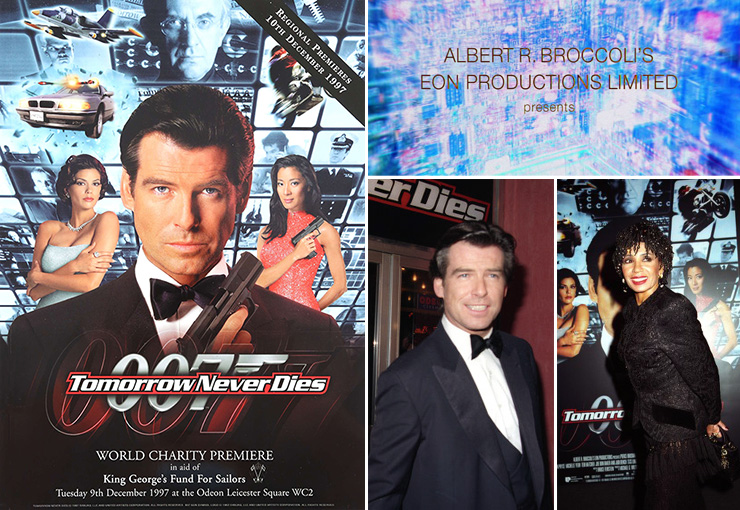 |
|
ABOVE: (left) The
souvenir brochure for the World Charity Premiere of Tomorrow
Never Dies held in aid of King George's Fund For Sailors on
Tuesday December 9, 1997. (top right) Beginning with Tomorrow
Never Dies all James Bond films have started with the line
“Albert R. Broccoli's EON Productions presents” in recognition of
the producer who (with Harry Saltzman) brought 007 to the big
screen. (bottom centre) Pierce Brosnan arrives at the ODEON
Leicester Square. (bottom right) Shirley Bassey was one of the
invited guests and James Bond alumni who included ‘Golden Girl’
Shirley Eaton, and Burt Kwouk who had also appeared in
Goldfinger (1964), followed by Casino Royale and You
Only Live Twice in 1967. |
|
|
|
Tomorrow Never Dies
had its World Charity Premiere at the ODEON Leicester Square, on December
9, 1997; followed by an after-premiere party at Bedford Square, home of
original Ian Fleming publisher, Jonathan Cape. Unusually, the premiere was
not attended by any members of the Royal family, and proceeds from the
charity event were donated to the King George's Fund For Sailors.
Tomorrow Never Dies went on general release in the UK and Ireland on
12 December and, in most other countries during the following week.
Budgeted at $110 million (almost double that of GoldenEye),
Tomorrow Never Dies went on to gross over $333 million worldwide.
Despite its script problems, the final film remains popular with fans, and
was made at a time the industry was embracing the possibilities of
Computer-Generated Imagery. There are some minor CGI effects in
Tomorrow Never Dies (notably the enhancement of skylines) but nothing
that detracts from the story and visuals as they would in 2002's
Die Another
Day made four years later. Pierce Brosnan’s second James Bond film was
the first to be heavily promoted on the Internet, and became the first of
the series to be released on a special edition DVD in the USA in 1998 -
with many behind-the-scenes featurettes and promotional materials, which
would become standard on later releases. The original DVD release is
unique in that it also includes as a special feature an isolated audio
track containing David Arnold’s complete score without dialogue or
effects. |
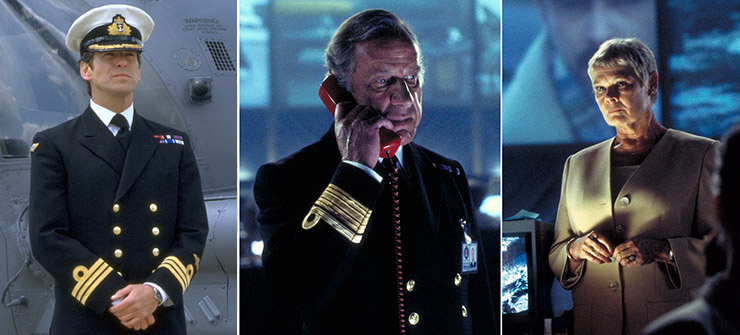 |
|
25 years on Tomorrow
Never Dies still stands up as an enjoyable entry in the series,
featuring the character of James Bond more in the style of the Sixties
interpretations. Falling somewhere between
Sean Connery’s and
Roger
Moore’s interpretation of Ian Fleming’s secret agent hero, Pierce Brosnan
proved popular at the time and remains so to this day. Brosnan’s portrayal
of James Bond in Tomorrow Never Dies won him the 1997 Saturn
Award for Best Actor; introduced in 1976, the Saturn awards are
presented annually by the Academy of Science Fiction, Fantasy & Horror
Films to honour the top works in science fiction, fantasy, and horror
in film, television, and home video. Pierce Brosnan was also nominated as
Best Actor for GoldenEye (1995) and again for Die Another Day
(2002). Daniel Craig was similarly nominated for playing James Bond in
Casino Royale (2006) and
Skyfall (2012). |




